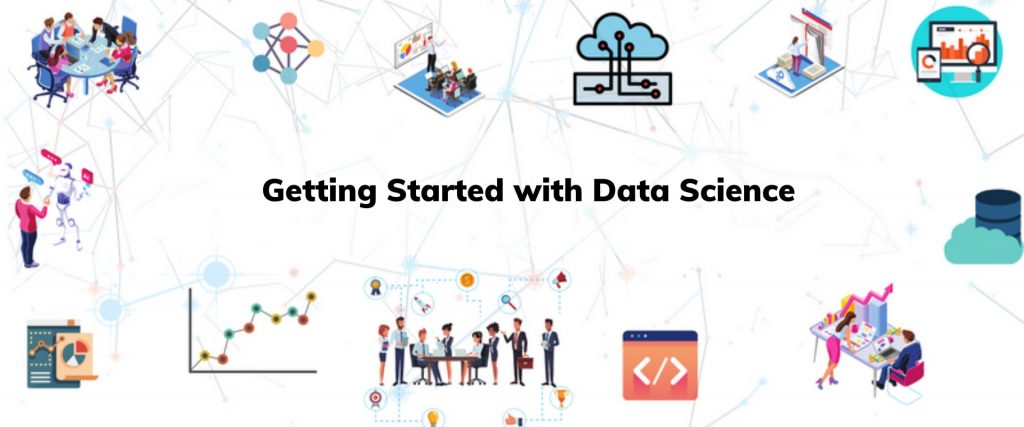What is Data Science?
Are you one of those people who don’t have a clue about data science? Everyone around you is talking about it but you don’t know anything about it?
Well then, this article is for you, if you want to know about this field. So in layman’s terms:
“Data science is the field of study that combines domain expertise, programming skills, and knowledge of mathematics and statistics to extract insights from data.”
We will go more deeply into this definition but first, let’s find out what is data science and why now.
The main aspect of data science is making insights out of given data and the 21st century is like a digital book written in a language of data. A huge amount of data produced every day in this era of the internet, there are 2.5 quintillion bytes of data produced every day at our current pace, and that pace is accelerating with the growth of technology.
Also with the advancement of technology, we have the computational power to store this much huge data and make insights out of it at low cost.
Study hard to become a data scientist
The first step towards becoming a data scientist is to acquire knowledge in specific subjects, to be able to make basic-level insights out of data and applying machine learning to the same data. To master these subjects one needs time and well-structured study plans, so I will also list out some free online courses.
Mathematics:
Probability, Calculus, and Linear Algebra are three topics where you should be thorough and able to solve problems. Although these topics are taught to students with mathematics as a subject in higher secondary and for people starting out fresh there are many online free courses available:
- Introduction to Mathematical Thinking by Stanford University on Coursera(8 weeks)
- Maths is Everywhere: Application for Finite Math by Davidson College on Udemy (1 week)
- Data-Science Maths skills by Duke University on Coursera (4 Weeks)
Statistics:
Descriptive and inferential statistics. Inferential statistics is one most important subject to make inferences out data but vast subject so I will list important topics:
Sampling, random variables, probability distributions, hypothesis testing and simple linear regression. Online courses:
- Intro to Descriptive Statistics by Udacity (8 weeks)
- Intro to Inferential statistics by Udacity (8 weeks)
- Mathematical Biostatistics Boot Camp by John Hopkins University on Coursera(4 weeks)
Programming:
This one of the most important aspects of being a data scientist, to able be to apply your gained knowledge on data you need to be proficient in a programming language, either R or Python (C++ is also a choice but R and Python are most used languages for data science). I prefer Python because coding is comparatively easy on Python than R. Basics of programming can be studied practically on sites like Hackerrank and Leetcode.
Machine Learning:
It is one of the best weapons in the arsenal of a Data scientist and another reason why you need to learn to program, to be able to make predictions using data. Machine learning is a subfield of artificial intelligence (AI), as the name suggests machine or system learns on data and then used in decision making based on its experience on the data it is fed upon.
I recommend practising machine learning on Python because of this really cool library on python “Scikit-Learn” popularly known as “Sk-learn”, which lets you use almost all algorithms with minimum coding required. Online courses:
- Introduction to machine learning on Udacity
- Machine Learning by Stanford University (Andrew Ng) on Coursera
- Intro to machine learning for coders on Fast.ai
Project is a must
After getting a basic level of knowledge the next step is to make your own project. Usually, data-science or machine-learning courses either give you an outline of a project or teach you how to make an end to end project. Projects are important because it’s a showcase of your skills and also it shows how industry-ready you are. Main parts of a project which people miss out are a problem statement (you trying to solve through your project) and deployment of the project. I will go in detail on these topics in a different article.
What to do next
To be accurate these are basic steps for those who want to become a data scientist. After these steps what you need to do is find a field of data science in which you want to grow like Computer Vision, Natural Language Processing and Business Analytics. Give yourself the time to learn and explore this field to know where you fit in.
thus, There many courses available in profound institutes one can pursue to become a data scientist. One thing to make sure is to keep learning and keep track of the trend in the industry.
written by: Saurav Kumar
Reviewed By: Krishna Heroor
If you are Interested In Machine Learning You Can Check Machine Learning Internship Program
Also Check Other Technical And Non Technical Internship Programs

